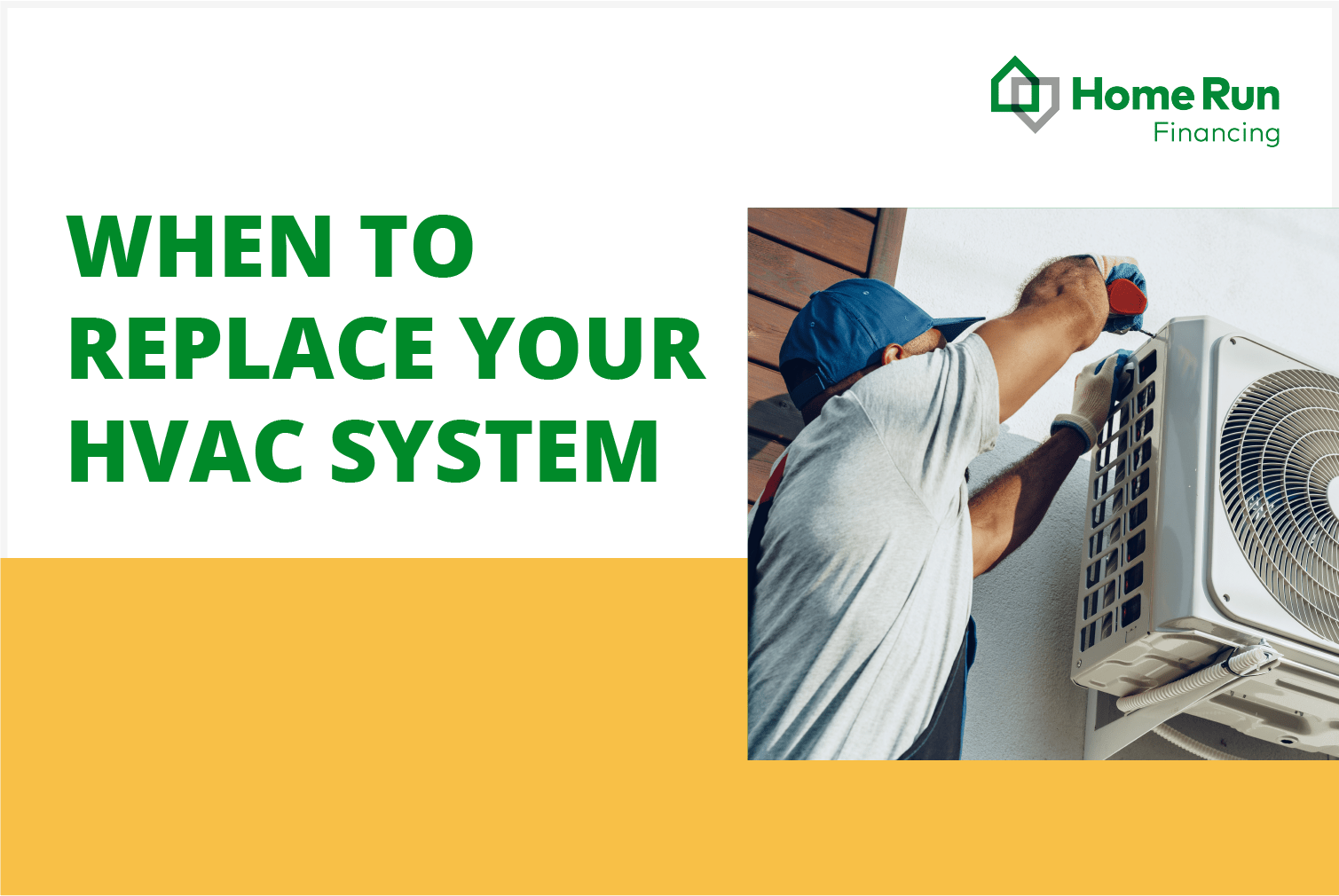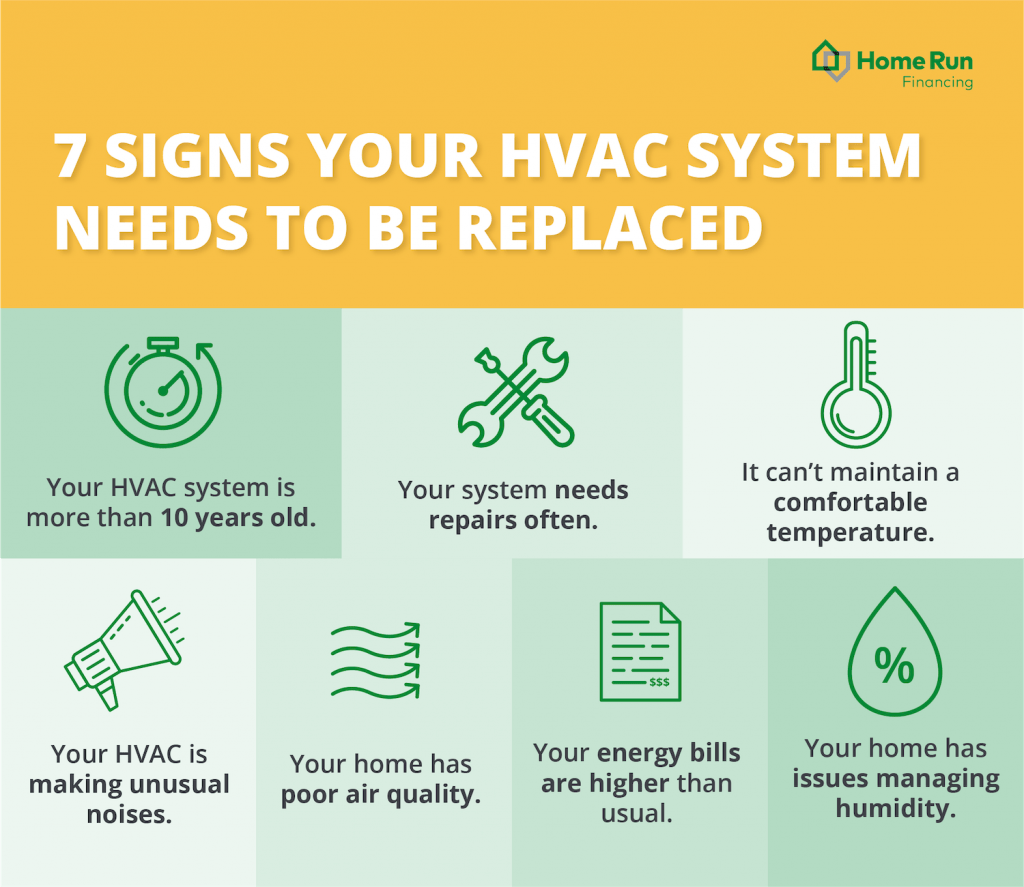
When to Replace Your HVAC System
A good heating, ventilation and air conditioning (HVAC) system is worth the investment. With regular maintenance, it can last a long time. But no matter what you do, systems age. Eventually, you’ll have to consider a whole new unit — and it’s a major expense.
To help you decide when your HVAC system is reaching the end of its life and needs replacement, let’s discuss the telltale signs when its time has come. We’ll cover the most common signs your HVAC system needs to be updated so you know when to call in the professionals. We’ll also look at how to cover the cost of replacing your HVAC.
7 signs your HVAC system needs to be replaced
- Your HVAC system is more than 10 years old.
- Your system breaks down or needs repairs often.
- You can’t maintain a comfortable temperature in your home.
- Your HVAC system is making unusual noises.
- Your home has poor air quality.
- Your energy bills are higher than usual.
- Your home has issues managing humidity.
What’s the best time of year to replace your HVAC?
Paying for your new HVAC system
7 signs your HVAC system needs to be replaced
When you’re trying to weigh the cost of repair against the total cost of HVAC system replacement, you need to consider more than just immediate expense. Future repairs that come with maintaining an older system can also be expensive. And don’t forget to factor in energy costs and potential health issues.
Knowing when it’s time to replace your HVAC might not be obvious unless you’re familiar with the signs. Here’s how to know when to replace an HVAC that’s beyond repair.

1. Your HVAC system is more than 10 years old.
How long does an HVAC system last? It’s a common question asked by homeowners, and there’s no definitive answer to how often to replace HVAC systems. The average life span of a quality HVAC system could be 15–20 years with regular maintenance, but even a top-of-the-line model starts to show signs of age by around 10–12 years.
And how long your HVAC system lasts often depends on where you live. Your system might not survive as long in places where your AC unit runs year-round against sweltering heat and high humidity. Homeowners might be looking for air conditioning replacement financing in Florida more often than people in milder climates.
An old HVAC system doesn’t need replacing if it’s running smoothly and maintains a constant, comfortable temperature in your home. Still, if you want to decrease your environmental impact and save on heating and cooling costs, a newer system may be worth the initial investment.
How much more efficient are new HVAC systems?
Newer systems with state-of-the-art technology are becoming more and more efficient, while old HVAC systems become less efficient as they age. Replacing a 10-year-old heat pump or air conditioner with a new Energy Star model with a SEER rating of 15 could save 20%–40% on home heating and cooling bills.
2. Your system breaks down or needs repairs often.
Even the most reliable HVAC systems break down now and then. If yours has started to break down more frequently, and one part after another needs to be repaired or replaced, the time will inevitably come where a complete system replacement is the cheaper option. As technology advances, old HVAC systems become obsolete, making finding parts much more difficult, not to mention more costly.
3. You can’t maintain a comfortable temperature in your home.
Constantly having to adjust your thermostat to find a comfortable temperature is not only a hassle; it’s a sign your system isn’t working properly. Either there’s a fault somewhere, or the whole system is becoming less efficient.
If your system can’t maintain consistent temperatures throughout your home — leaving some rooms too hot and others too cold — it’s an indication of other problems. Uneven temperature is a sign that it might be time to think about updating to a more efficient system.
4. Your HVAC system is making unusual noises.
Quite often, a damaged system will start audibly sharing its pain. It can be a mistake to ignore odd noises. Knocking, grinding, screeching or anything else out of the ordinary could be a major duct issue, bad coils or some other issue in the cooling system that requires extensive repair. Regardless, if your HVAC starts grumbling, it’s probably time to start looking for a new one.
5. Your home has poor air quality.
Do you see a lot more dust than usual? Or notice other signs that your air quality isn’t that great? This can be caused by your HVAC not working as it should. If you’re regularly seeing dust particles floating in the air or notice that dust is settling more quickly than usual, it could mean more than just clogged filters. Your filtration and circulation systems could require some special attention.
With the air quality innovations in today’s smart technology, the air in your home should look and smell fresh. A good central air conditioning system acts as an air purifier, removing most dust, food smells and funky odors and replacing them with fresh, clean air.
6. Your energy bills are higher than usual.
If you notice that your energy bills have been creeping up gradually, or you get a much higher bill than usual, it could be caused by a fault or system failure. Your HVAC system may be getting less efficient. Even a well-maintained system will eventually grow less efficient with time.
The older a system is, the less efficient it will be, especially when compared to a new, high-efficiency HVAC system. An older system will have to work much harder to maintain the same comfort levels, making your costs gradually creep up, even if your home is well insulated. And those higher bills will get harder and harder to tolerate once you know how much more efficient a new HVAC system can be.
7. Your home has problems managing humidity.
Excess humidity in the air can cause serious problems for your home. High humidity levels cause windows to get covered in condensation and, if not addressed, can lead to mold, mildew and, in severe cases, rot. These issues can become very expensive to fix. The longer they’re left, the further the issues spread and the more costly the repair bill becomes.
In addition to damaging your home, high levels of humidity combined with mold and mildew in the air can damage the health of you and your family. Breathing issues can be serious, and medical bills can add up. With all things considered, completely replacing your HVAC system might be the cheaper option.
What’s the best time of year to replace your HVAC?
It’s generally faster (and often cheaper) to get your HVAC system replaced during the off-season. Usually, the “off-season” is considered those few weeks between peak heating and air conditioning seasons. Depending on where you live, it might be best to take the plunge in early spring, between the cold winter and the hot summer. If the weather is milder at the end of the summer and the cold of winter doesn’t settle in too early where you live, fall might be the best time of year to replace your HVAC system.
Full system replacement can take a week or more in an average house. Unless your replacement is an emergency, ideally, you want to plan a replacement for a time of year when the weather is on your side and won’t leave you freezing or roasting. During the height of summer and the depths of winter, HVAC contractors are often dealing with emergency breakdowns and urgent installations. Inclement weather can also influence completion times. Avoiding the “busy season” can help dodge other complications that delay the installment of your new HVAC system.
If you need help deciding when is the best time of year to replace your HVAC, contact Home Run Financing to connect with an HVAC system replacement expert in your area.
Paying for your new HVAC system
No one knows exactly how long your HVAC system will last. But if it’s experiencing any of the above symptoms, it’s time to call a licensed professional heating and cooling expert and arrange for replacement. Don’t let the upgrade cost put you off. If you’re worried about how you’ll be able to pay for it, consider PACE financing.
Home Run Financing can help you with HVAC financing — and even home improvement financing for other projects. Your credit rating doesn’t determine eligibility, and you’ll be connected with approved contractors to help you get the job done properly and quickly. From HVAC systems to roof replacement, Home Run Financing helps homeowners pay for expensive home repairs.
